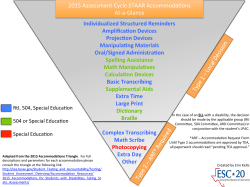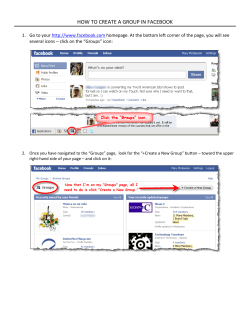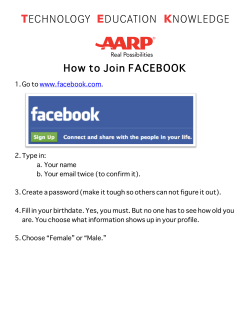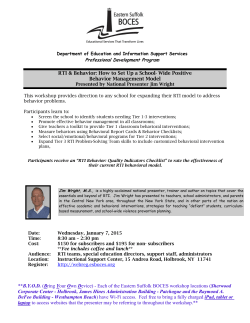
Q1 : When did RTI Act come into force in India ? 12/10 - Moh-Maya
http://moh-maya.in http://sparkingdeals.in/ldce Say thanks by giving a like to our Facebook page http://www.facebook.com/sparkingdeals Q1 : When did RTI Act come into force in India ? 12/10/2005 ------------------------ Correct 12/06/2005 12/11/2005 12/05/2005 Q2: Can you ask for reports and records under RTI Act. : TRUE Q3. Who can seek information under RTI Act, 2005 ? A group of persons Individual Citizen ---------------------Correct A registered company An association/Society Q4: Which officer in the public authority provides the information ? APIO PIO ---------------------------------CORRECT Appellate authority PRO Q5: Within what time should the information be provided ? ( In normal case ) 45 days 30 days ---------------------------------Correct 60 days 15 days Q6: Within what time should the information be provided ? ( In case of matter of life and death ) 72 hours 48 hours ---------------------------------Correct 24 hours None of these Q7: Which was the first country in the World to have enacted a legislation for providing for citizens` RTI? Sweden -------------------Correct India Canada France Q8: RTI laws are also referred to as "open-government laws" and "sunshine laws. TRUE Q9: Which was the State in which local authorities started providing people access to Special thanks to Sh. Devendra Modi (JTO NTR Panipat) http://moh-maya.in http://sparkingdeals.in/ldce Say thanks by giving a like to our Facebook page http://www.facebook.com/sparkingdeals certain information related to the `Public Distribution System` (PDS) even before the State Assembly introduced / passed an RTI Act? West Bengal Rajasthan Madya Pradesh ----------------------Correct Kerala Q10: How many schedules does the `RTI Act, 2005` have? 2 ---------------------Correct 3 4 5 Q11: Indian citizens have the right to information because of ……….. Judgment of Supreme Court Implementation of International Laws by Indian Government All states adopted agree to implement the Act a law passed by the Parliament of India. ------------------Correct Q12: The time limit specified in the `RTI Act, 2005` for the Central / State Information Commissions to decide on complaints is …………… a) 15 days b) One Month C) Two Months d) No such time limit has been specified. ----------------Correct Q13: "Deemed refusal" under the `RTI Act, 2005` is failure on a PIO`s part to provide information within the specified time limits. --------------------Correct Q14: A first appeal against the decision of a PIO can be preferred by…………….. An Applicant A person from within the Public Authority. A person outside the Public Authority to whom the information pertains All of these ----------------------Correct Q15 : . While inquiring into a complaint, Information Commissions have the power to ……………….. Receive evidence on affidavit. Requisition record or copies thereof from any court or office. Issue summons for examination of witnesses or documents. All of these. ------------------Correct Special thanks to Sh. Devendra Modi (JTO NTR Panipat) http://moh-maya.in http://sparkingdeals.in/ldce Say thanks by giving a like to our Facebook page http://www.facebook.com/sparkingdeals Q16 : A Public Information Officer will be liable to be imposed a monetary penalty for ………………….. refusal to receive an information application. not providing information within specified time limits. destroying information. All of them ------------------------Correct Q18 : The Second Schedule of the RTI Act, 2005 lists ……………….. the intelligence and security organizations established by the Central Government that are exempted from the purview of the `RTI Act, 2005 --------------------Correct All Departmental information of Central and State Both of these None of These Q19 : The Second Schedule of the RTI Act, 2005 can be amended by ……….. Central Govt -----------------------------Correct State Govt Both None Q20: According to the `RTI Act, 2005`, as far as exempted organizations are concerned, the exemption applies to …………………. Certain organizations of the Central Government as listed in the 2nd Schedule and to the information submitted by these organizations to this Government. Certain organizations of the State Governments as may be notified by them in the Official Gazette, but NOT to the information furnished by these organisations to the respective State Governments. Both of these ---------------------Correct None of these Q21 : What is the time span mentioned in the `RTI Act, 2005` for making orders for removing difficulties in giving effect to the provisions of the `RTI Act, 2005`? 2 years from the commencement of the Act. ------------------Correct 1 years from the commencement of the Act. 3 years from the commencement of the Act. 4 years from the commencement of the Act. Special thanks to Sh. Devendra Modi (JTO NTR Panipat) http://moh-maya.in http://sparkingdeals.in/ldce Say thanks by giving a like to our Facebook page http://www.facebook.com/sparkingdeals Q22 : The Act extends to the whole of India except the States of Jammu and Kashmir. TRUE Q23: What could be the ground for rejection? If it is covered by exemption from disclosure. If it infringes copyright of any person other than the State Both of these ------------------------Correct None of these Q24: The Right to Information is associated with the fundamental right of Freedom of speech and expression. TRUE Q25: When an application is received through the A. P. I. O, what is the time limit for Providing information? 30 days 35 days ----------------------- Correct 40 days 45 days Q26 If the first appeal is not effective, the applicant can appeal directly to the State Information Commission. : TRUE Q27: Those who are below poverty line are exempted from fees of getting information. TRUE Q28: What is the fee(cost) when information is sought in A4 paper? Rs. 2 Per page ------------------------------Correct Rs. 1 Per page Rs. 3 Per page Rs. 0.50 Per page Q29 : What is the fee prescribed for the examination of documents for the first hour ? No Fee ------------------------ Correct Rs. 30 Rs. 10 Rs. 50 Q30: What is the fee for filing appeal? Special thanks to Sh. Devendra Modi (JTO NTR Panipat) http://moh-maya.in http://sparkingdeals.in/ldce Say thanks by giving a like to our Facebook page http://www.facebook.com/sparkingdeals No Fee ------------------------ Correct Rs. 30 Rs. 10 Rs. 50 Q31: Within what time the second appeal should be filed? 30 days 45 days 60 days 90 days --------------------------- Correct Q32 . First appeal should be filed within 30 days from the decision of the PIO. TRUE Q33. If the information sought is in the custody of another Public Authority, The PIO should send the application or relevant portion to that public authority within five days. He should also inform the applicant. TRUE Q34: Who constitutes the Central Chief Information Commission? The Central Govt. --------------------Correct A group of NGOs All State Govts. None of these Q35: Who appoints the Central Chief Information Commissioner? The Prime Minister of India The President of India -----------------------Correct Both of these None of these Q36: Who appoints the State Information Commissioner? The Chief Minister of the State The Governor of the State -------------------------- Correct The President of India None of these Q37: The Official Secrets Act 1923 is reduced in power after the passing of the RTI Act. TRUE Q38: You are required to provide the reasons for asking information. FALSE Q39: Oral request is sufficient to seek information. FALSE Q40: Information relating to cabinet papers should be given to citizens on request. : FALSE Special thanks to Sh. Devendra Modi (JTO NTR Panipat) http://moh-maya.in http://sparkingdeals.in/ldce Say thanks by giving a like to our Facebook page http://www.facebook.com/sparkingdeals Q41: You can request for more than one information in a single application. TRUE Q42: The RTI Act is not applicable to the High Court and Supreme Court. : FALSE Special thanks to Sh. Devendra Modi (JTO NTR Panipat)
© Copyright 2025

















![[ PDF ] - Journal of Evolution of Medical and Dental](http://cdn1.abcdocz.com/store/data/000813110_1-74ceca31ac7f3dba14fd2cbca7ce4011-250x500.png)
